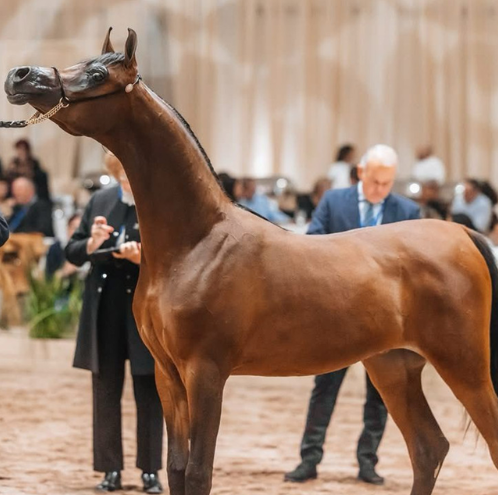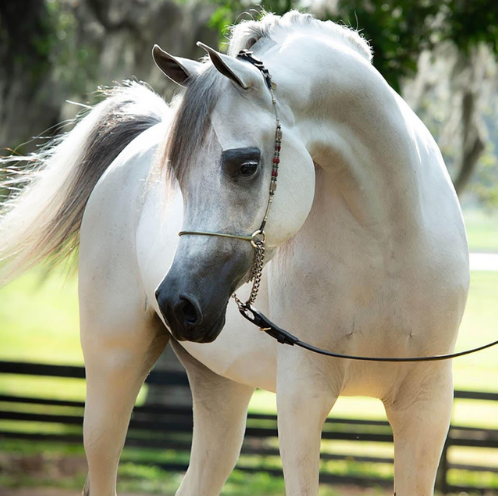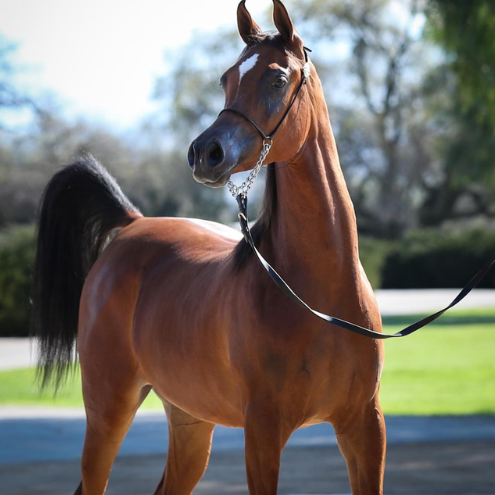History of the Arabian Horse
The Arabian horse is one of the oldest and most documented horse breeds in human history, with origins that trace back thousands of years to the deserts of the Arabian Peninsula. More than just a riding animal, the Arabian horse was a symbol of honor, survival, and legacy — a trusted partner to the Bedouin tribes who shaped its early development.
Today, the Arabian horse is admired around the world for its beauty, intelligence, refinement, and unmatched endurance. Its bloodlines have influenced nearly every modern light horse breed, making the Arabian horse not only a treasure of the past, but a living cornerstone of the global equine world.
Origins in the Arabian Desert
The earliest evidence of the Arabian horse dates back more than 4,000 years. Rock carvings, ancient writings, and preserved oral histories describe a refined, spirited desert horse bred specifically for war, travel, and family protection.
For the Bedouin, the Arabian horse was more than livestock — it shared tents, food, and water with its owners. Only the most loyal, intelligent, and physically gifted horses were allowed to reproduce, creating a breed shaped by both nature and culture.
Key Survival Traits Developed in the Desert
• Ability to thrive on minimal water and feed
• Exceptional lung capacity for long-distance travel
• Calm temperament suitable for life among families
• Strong bones, dense hooves, and efficient movement
The Arabian Horse in War, Travel & Trade
Arabian horses were prized as war mounts due to their courage, speed, and loyalty. Their stamina allowed armies to travel great distances without exhaustion, giving them a strategic advantage.
As trade routes expanded, so did the fame of the Arabian horse, which was gifted to kings, emperors, and military leaders. These exchanges helped spread Arabian bloodlines into Asia, Europe, and later the Americas.
By the 1700s and 1800s, Arabians were imported in large numbers to improve local cavalry horses, carriage horses, and later, early racing and sport breeds.
The Arabian’s Influence on Modern Breeds
Few horses in history have had a greater genetic impact than the Arabian.
Breeds that carry Arabian ancestry include:
• Thoroughbred
• American Quarter Horse
• Orlov Trotter
• Morgan
• Andalusian
• Anglo-Arabian
• Trakehner
• Welsh Pony
Even today, warmblood registries allow controlled Arabian infusion to improve refinement, agility, and spirit.
Wherever refinement and endurance are desired, the Arabian horse remains the foundation.
Preserved Bloodlines & Global Breeding Programs
From the 19th century onward, several countries developed distinct Arabian programs:
• Egypt – Straight Egyptian, classic type, fine heads
• Poland – Strong bone, athletic movement
• Russia – Larger frames, powerful presence
• England (Crabbet) – Riding quality, balanced structure
• United States – Blended lines, halter + performance focus
Each region preserved the same ancient horse, but emphasized different strengths — from extreme refinement to athletic power.
The Arabian Horse in the Modern World
The Arabian continues to excel in:
• Endurance riding (world record breed)
• Halter and in-hand showing
• English and Western performance
• Dressage, sport horse, and hunter classes
• Family and youth riding
• Cultural and ceremonial events
Its timeless beauty and intelligence have helped the breed remain relevant not just in competitions, but in breeding programs, tourism, film, and elite private collections.
Why the Arabian Horse Still Matters
The Arabian horse is a living piece of history — a direct genetic link to the horses that carried prophets, kings, explorers, and warriors across continents. While many breeds have changed dramatically over time, the Arabian remains true to its ancient form, preserved through centuries of intentional breeding.
It represents:
• Purity of blood
• Endurance of spirit
• Partnership between human and horse
• A heritage still alive today
Contact Al Ameera Stud for Inquiries or to Schedule a Visit
To admire the Arabian is to appreciate both its history and its future. If you are interested in learning more about ownership, bloodlines, or the modern role of the Arabian horse, we welcome inquiries from enthusiasts, breeders, and newcomers alike.
Whether you are searching for a future show prospect, a foundation mare, or a lifelong companion, we are happy to answer questions, share pedigree details, or help guide you toward the right Arabian horse.
Phone: (630) 215-5545
Email: alameerastable@gmail.com
Location: 24224 S 88th Ave, Frankfort, IL 60423
Visiting Hours: By appointment only
INTERNATIONAL INQUIRIES WELCOME
Explore More Arabian Horse Guides
Arabian Horse Guide (Main Page)
History of the Arabian Horse
Arabian Horse Bloodlines & Types
Arabian Horse Temperament & Intelligence
Arabian Horse Care & Feeding Guide
Arabian Horse Training & Performance Disciplines
Arabian Horse Breeding & Bloodlines Overview
Arabian Horse Conformation & Anatomy
Arabian Horse Prices & Buying Guide
Arabian Horse Registration & Pedigree Papers Explained
Arabian Horse Endurance & Athletic Ability




